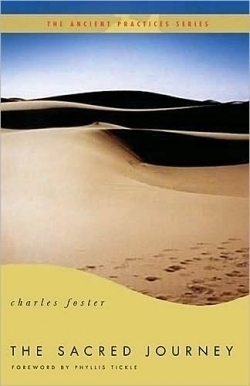
The Sacred Journey
The Ancient Practices
“The Buddha’s last words to his disciples were, ‘Walk on.’ The first words of Jesus to his were rather different: ‘Follow me.’ Jesus said some other things, too,” author Charles Foster writes, “but as a summary of the four gospels, ‘Let’s go for a walk together’ is not bad.”
The surface of the planet is marked with the footsteps of those who wander; nomads, for reasons both secular and sacred, have scarred her face with their shoes, sandals, or, better yet, according to Foster, their bare feet, for eons. While today’s settled and mostly sedentary city-dwellers may find it easy to understand those who wander in search of food and water for themselves or their flocks, or those who leave everything behind for fame and fortune, wandering in the name of a supernatural being in search of something as yet undefined may seem absurd.
Foster, a prolific author, barrister, and University of Oxford tutor, begins and ends The Sacred Journey, his “theology of pilgrimage,” with apologies to his readers. Some may take offense, as he has no kind words for the foolish, the superstitious, or those who prefer to remain ignorant and on the couch in spite of the fact that the story of religion is, literally, a story of movement. Indeed, Foster says that the best way to describe humanity may well be to call us “striders,” at our best when on the move and unencumbered by the things of the world.
Foster does his best to make sense of the seemingly eternal conflict between settlers and nomads. This enmity is rooted in the Bible’s portrayal of Yahweh as a god of the wild places, more at home at the edge of the city than within it, and partial to the nomad and his offerings; he is a god that takes great pleasure in the smell of roasted flesh while scorning offerings from planted fields.
Jesus the Christ, called the “Son of God,” is, even in his mother’s womb, a wanderer—born in a town not his own and visited by sages from afar, he calls others to leave everything and wander with him, saying that in so doing they will have chosen the better part. The rules of the road, both in the travel guide authored by Jesus and as today’s pilgrims experience them, turn the rules of life within the walls of the city upside down. The Kingdom of God is not to be found in a place, but is eminently portable—it is found within; in this kingdom the last are to be first, the poor are really richer than the rich, those who lose everything for Jesus’ sake will find even greater reward, and the mighty are undone by a little child.
Foster comes down hard on those who deny the body for “spiritual” reasons. There can be no denying the body on the road: it hungers and thirsts for what will not be forthcoming for many miles; it sweats and strains and smells as it trudges along dusty roads in the company of others equally tired and smelly. Pilgrims know that it is the daily grappling with the harshness of the road that brings health to body, mind, and soul—the steely, tough, wild-eyed health of one known for crying out words like “repent” in the wilderness and the marketplace.
Foster’s book, part rant and part love-poem to the body and its animating spirit, is a pilgrimage through pilgrimage itself, and like the actual trek, it invites reflection. Through vivid descriptions—one can taste dust and blood, and feel one’s feet blistering—one is brought to consider the paring-down that the pedestrian journey demands, a task much better done willingly, joyfully, “for the kingdom,” than under duress. Foster’s paring down is transformational—not just belongings, but one’s ego must be left behind, as it weighs too much for the journey. And one might just as well throw one’s “respectability,” status in the hierarchy, and all one’s labels and degrees into the fire as well—there are no titles, no entitlements on the road. Pack lightly, Foster suggests: kindness, humility, and the simplicity and wonder of a child don’t weigh much. And remember that the direction in which one heads doesn’t matter at all—it is not the destination that makes the trip worthwhile, it is the journey.
Reviewed by
Kristine Morris
Disclosure: This article is not an endorsement, but a review. The publisher of this book provided free copies of the book to have their book reviewed by a professional reviewer. No fee was paid by the publisher for this review. Foreword Reviews only recommends books that we love. Foreword Magazine, Inc. is disclosing this in accordance with the Federal Trade Commission’s 16 CFR, Part 255.
